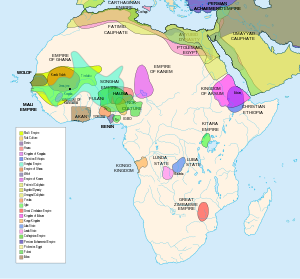
Back الممالك في إفريقيا قبل الاستعمار Arabic Liste historischer Staaten in Afrika German Anexo:Imperios africanos Spanish Liste de civilisations de l'Afrique précoloniale French Աֆրիկայի նախագաղութային պետությունների ցանկ Armenian 植民地化以前のアフリカ諸国 Japanese Lista de estados pré-coloniais da África Portuguese Доколониальные государственные образования в Африке Russian පූර්ව-යටත් විජිත අප්රිකාවේ රාජධානි Singhalese

This is a list of kingdoms and empires in Africa throughout history, with exceptions for a few non–contemporary republics.
The vast majority of kingdoms included in this list existed prior to the Scramble for Africa (c. 1880–1914) when almost all of the continent came under the control of European powers.
Some kingdoms, such as the Kingdom of Ardra in Benin, Kingdom of Buganda in Uganda, or the Kingdom of Bailundo in Angola, still exist today as non–sovereign monarchies. The roles, powers, and influence of non–sovereign monarchs throughout Africa vary greatly depending on the state. In some states, such as Angola, the local monarch may play an integral role in the local governing council of a region.[1][2] They are often regarded as custodians of tradition and culture, and in some cases, play an important role in local religious activities.[3][4] On the flipside their powers may be curtailed, as happened in 2022 with Wadai in Chad,[5] or had their positions abolished, as happened in Tanzania in 1962,[6] and in 1966 in Uganda with Buganda, which was later restored in 1993. In this list they are labelled (NSM).
There are only three current sovereign monarchies in Africa;[7][8] two of which (Lesotho and Morocco) are constitutional monarchies where the rulers are bound by laws and customs in the exercise of their powers, whilst one (Eswatini) is an absolute monarchy where the monarch rules without bounds. Sovereign monarchies are labelled (SM).
There have been a number of autocrats in Africa who invoked hereditary succession in order to preserve their regimes,[9] such as the Bongos of Gabon,[10] Gnassingbés of Togo,[11] or Aptidon–Guelleh of Djibouti,[12] generating the term monarchical republic.[13] These have been tentatively included due to their similarities to, and possibly even taking inspiration from, the institution of monarchy and are labelled (MR).
- ^ Florêncio, Fernando (2017-08-04). No Reino da Toupeira: Autoridades Tradicionais do M'balundu e o Estado Angolano [In the Mole Kingdom: Traditional M'balundu Authorities and the Angolan State]. ebook'IS (in Portuguese). Lisboa: Centro de Estudos Internacionais. pp. 79–175. ISBN 978-989-8862-32-7. Archived from the original on 2021-07-28. Retrieved 2022-08-21.
- ^ Orock, Rogers Tabe Egbe (2014). "Welcoming the ' Fon of Fons ': Anglophone Elites and the Politics of Hosting Cameroon's Head of State". Africa. 84 (2): 226–245. doi:10.1017/S0001972013000776. ISSN 0001-9720. S2CID 144143841. Archived from the original on 2023-05-25. Retrieved 2023-06-21.
- ^ Butler, Stuart. "The voodoo priests, kings and ghosts of Benin". www.bbc.com. Archived from the original on 2024-02-27. Retrieved 2023-06-21.
- ^ Nigeria, Guardian (2019-10-18). "Oba Ewuare II: A quintessential monarch at 66". The Guardian Nigeria News - Nigeria and World News. Archived from the original on 2023-06-21. Retrieved 2023-06-21.
- ^ "Chad: protests over Ouaddai sultanate autonomy". CounterVortex. 2022-01-31. Archived from the original on 2023-06-19. Retrieved 2023-06-21.
- ^ "Tanzania chiefs and monarchs". The African Royal Families. 13 June 2023. Archived from the original on 20 March 2024. Retrieved 20 March 2024.
- ^ Mfonobong Nsehe. "The 5 Richest Kings In Africa - page 1". Forbes. Archived from the original on 25 November 2018. Retrieved 4 January 2016.
- ^ Mfonobong Nsehe. "The 5 Richest Kings In Africa - page 2". Forbes. Archived from the original on 7 July 2022. Retrieved 4 January 2016.
- ^ Brownlee, J. (2007). "Hereditary Succession in Modern Autocracies". World Politics. 59 (4). Cambridge University Press: 595–628. doi:10.1353/wp.2008.0002. S2CID 154483430. Archived from the original on 2024-03-01. Retrieved 2024-03-01.
- ^ Mengara, Daniel (2020). "The Making of a Monarchical Republic: The Undoing of Presidential Term Limits in Gabon Under Omar Bongo". The Politics of Challenging Presidential Term Limits in Africa. Palgrave Macmillan. pp. 65–104. doi:10.1007/978-3-030-40810-7_3. ISBN 978-3-030-40809-1. S2CID 216244948. Archived from the original on 2024-03-01. Retrieved 2024-03-01.
- ^ Osei, Anja (2018). "Like father, like son? Power and influence across two Gnassingbé presidencies in Togo". Democratization. 25 (8): 1460–1480. doi:10.1080/13510347.2018.1483916. Archived from the original on 2024-01-05. Retrieved 2024-03-01.
- ^ Bezabeh, Samson (2023). Djibouti: A political history (PDF). Lynne Rienner. Archived (PDF) from the original on 2023-10-14. Retrieved 2024-03-14.
- ^ Mengara, Daniel (2020). "The Making of a Monarchical Republic: The Undoing of Presidential Term Limits in Gabon Under Omar Bongo". The Politics of Challenging Presidential Term Limits in Africa. Palgrave Macmillan. pp. 65–104. doi:10.1007/978-3-030-40810-7_3. ISBN 978-3-030-40809-1. S2CID 216244948. Archived from the original on 2024-03-01. Retrieved 2024-03-01.
© MMXXIII Rich X Search. We shall prevail. All rights reserved. Rich X Search